- September 11: Consequences for Canada - Kent Roach
- Reproductive Health and Human Rights: Integrating Medicine, Ethics and Law - Rebecca J. Cook, Bernard M. Dickens and Mahmoud F. Fathalla
- Rethinking the Reasonable Person: An Egalitarian Reconstruction of the Objective Standard - Mayo Moran
- Dimensions of Private Law: Categories and Concepts in Anglo-American Legal Reasoning - Stephen Waddams
- Murdering Holiness: The Trials of Franz Creffield and George Mitchell - Jim Phillips and Rosemary Gartner
- Freud's Theory of Culture: Eros, Loss, and Politics - Abraham Drassinower
- Canadian Constitutional Law, Third Edition - Various
- Tort Law, The International Library of Essays in Law & Legal Theory, Second Series - Edited by Ernest Weinrib
- The Rule of Last Clear Chance - Judith McCormack
- Canadian Bankruptcy and Insolvency Law - Jacob Ziegel, Tony Duggan, and Thomas Telfer
- Comparative Consumer Insolvency Regimes - Jacob Ziegel
- Tort Law: Cases And Materials, Second Edition - Ernest Weinrib
September 11: Consequences for Canada
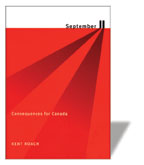 The September 11 terrorist attacks on the World Trade Center and the Pentagon have forced countries around the world to reevaluate their defence policies. In September 11 Kent Roach provides a critical examination of the consequences of September 11 for Canada, showing how our laws, democracy, sovereignty, and security have been affected. A broad range of anti-terrorism measures are assessed, including the Anti-terrorism Act, the smart border agreement, Canadian participation in the war in Afghanistan, changes to refugee policy, the 2001 Security Budget, and the proposed Public Safety Act. Referring specifically to the threat of nuclear and biological terrorism and aviation safety, Roach argues that more emphasis on administrative and technological measures and less emphasis on criminal sanctions and military force may better protect Canadians from both terrorism and other threats to their security.
The September 11 terrorist attacks on the World Trade Center and the Pentagon have forced countries around the world to reevaluate their defence policies. In September 11 Kent Roach provides a critical examination of the consequences of September 11 for Canada, showing how our laws, democracy, sovereignty, and security have been affected. A broad range of anti-terrorism measures are assessed, including the Anti-terrorism Act, the smart border agreement, Canadian participation in the war in Afghanistan, changes to refugee policy, the 2001 Security Budget, and the proposed Public Safety Act. Referring specifically to the threat of nuclear and biological terrorism and aviation safety, Roach argues that more emphasis on administrative and technological measures and less emphasis on criminal sanctions and military force may better protect Canadians from both terrorism and other threats to their security.
Back to Top
Reproductive Health and Human Rights: Integrating Medicine, Ethics and Law
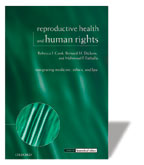 The book is designed to equip health care providers and administrators to integrate ethical, legal, and human rights principles in protection and promotion of reproductive health, and to inform lawyers and women's health advocates about aspects of medicine and health care systems that affect reproduction. The authors integrate their disciplines in reproductive medicine, women's health, human rights, medical law and bioethics, to provide an accessible but comprehensive introduction to reproductive and sexual health. They analyze fifteen case studies of recurrent problems, focusing particularly on resource-poor settings. Approaches to resolution are considered at clinical and health system levels. They also consider kinds of social change that would relieve the underlying conditions of reproductive health dilemmas. The aim is to equip readers to fashion solutions in their own health care circumstances, compatibly with ethical, legal and human rights principles.
The book is designed to equip health care providers and administrators to integrate ethical, legal, and human rights principles in protection and promotion of reproductive health, and to inform lawyers and women's health advocates about aspects of medicine and health care systems that affect reproduction. The authors integrate their disciplines in reproductive medicine, women's health, human rights, medical law and bioethics, to provide an accessible but comprehensive introduction to reproductive and sexual health. They analyze fifteen case studies of recurrent problems, focusing particularly on resource-poor settings. Approaches to resolution are considered at clinical and health system levels. They also consider kinds of social change that would relieve the underlying conditions of reproductive health dilemmas. The aim is to equip readers to fashion solutions in their own health care circumstances, compatibly with ethical, legal and human rights principles.
Back to Top
Rethinking the Reasonable Person: An Egalitarian Reconstruction of the Objective Standard
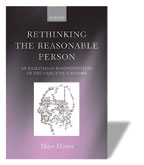 The reasonable person standard plays a central role in the law, figuring prominently in tort law, criminal law, and administrative law. However, the reasonable person has also attracted substantial criticism from egalitarian critics and feminists insofar as it presupposes contested notions of "normal" behaviour and may discriminate against certain classes of defendant. Judges and mainstream theorists also increasingly puzzle over what the standard amounts to and how to apply it. Using these controversies as a point of departure, Rethinking the Reasonable Person examines the promise and the perils of the reasonable person standard. Ultimately, it argues that an objective standard is not only defensible but essential. Yet only with a radical reconstruction will it be possible to realize the promise of the standard and to ensure a truly egalitarian conception of responsibility.
The reasonable person standard plays a central role in the law, figuring prominently in tort law, criminal law, and administrative law. However, the reasonable person has also attracted substantial criticism from egalitarian critics and feminists insofar as it presupposes contested notions of "normal" behaviour and may discriminate against certain classes of defendant. Judges and mainstream theorists also increasingly puzzle over what the standard amounts to and how to apply it. Using these controversies as a point of departure, Rethinking the Reasonable Person examines the promise and the perils of the reasonable person standard. Ultimately, it argues that an objective standard is not only defensible but essential. Yet only with a radical reconstruction will it be possible to realize the promise of the standard and to ensure a truly egalitarian conception of responsibility.
Back to Top
Dimensions of Private Law: Categories and Concepts in Anglo-American Legal Reasoning
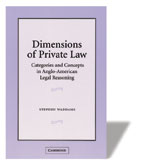 Anglo-American private law (the law governing mutual rights and obligations of individuals) has been a far more complex phenomenon than is usually recognized. Attempts to reduce it to a single explanatory principle, or to a precisely classified or categorized map, scheme, or diagram, are likely to distort the past by omitting or marginalizing material inconsistent with proposed principles or schemes. Many legal issues cannot be allocated exclusively to one category. Often several concepts have worked concurrently and cumulatively, so that competing explanations and categories are not so much alternatives, of which only one can be correct, as different dimensions of a complex phenomenon, of which several may be simultaneously valid and necessary. This study will be of importance to those interested in property, tort, contract, unjust enrichment, legal reasoning, legal method, the history of the common law, and the relation between legal theory and legal history.
Anglo-American private law (the law governing mutual rights and obligations of individuals) has been a far more complex phenomenon than is usually recognized. Attempts to reduce it to a single explanatory principle, or to a precisely classified or categorized map, scheme, or diagram, are likely to distort the past by omitting or marginalizing material inconsistent with proposed principles or schemes. Many legal issues cannot be allocated exclusively to one category. Often several concepts have worked concurrently and cumulatively, so that competing explanations and categories are not so much alternatives, of which only one can be correct, as different dimensions of a complex phenomenon, of which several may be simultaneously valid and necessary. This study will be of importance to those interested in property, tort, contract, unjust enrichment, legal reasoning, legal method, the history of the common law, and the relation between legal theory and legal history.
Back to Top
Murdering Holiness: The Trials of Franz Creffield and George Mitchell
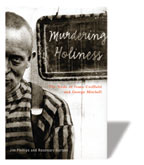 Murdering Holiness explores the story of the "Holy Roller" sect led by Franz Creffield in the early years of the twentieth century. In the opening chapters, the authors introduce us to the community of Corvallis, Oregon, where Creffield, a charismatic, selfstyled messiah, taught his followers to forsake their families and worldly possessions and to seek salvation through him. As his teachings became more extreme, the local community reacted: Creffield was tarred and feathered and his followers were incarcerated in the state asylum. Creffield himself was later imprisoned for adultery, but shortly after his release he revived the sect. This proved too much for some of the adherents' families, and in May 1906 George Mitchell, the brother of two women in the sect, pursued Creffield to Seattle and shot him dead. The authors take us into the courtroom for the trial that made headlines across North America. Based on court records and archival sources, this case study includes a detailed examination of the trial, the media's response to it, and the dramatic aftermath.
Murdering Holiness explores the story of the "Holy Roller" sect led by Franz Creffield in the early years of the twentieth century. In the opening chapters, the authors introduce us to the community of Corvallis, Oregon, where Creffield, a charismatic, selfstyled messiah, taught his followers to forsake their families and worldly possessions and to seek salvation through him. As his teachings became more extreme, the local community reacted: Creffield was tarred and feathered and his followers were incarcerated in the state asylum. Creffield himself was later imprisoned for adultery, but shortly after his release he revived the sect. This proved too much for some of the adherents' families, and in May 1906 George Mitchell, the brother of two women in the sect, pursued Creffield to Seattle and shot him dead. The authors take us into the courtroom for the trial that made headlines across North America. Based on court records and archival sources, this case study includes a detailed examination of the trial, the media's response to it, and the dramatic aftermath.
Back to Top
Freud's Theory of Culture: Eros, Loss, and Politics
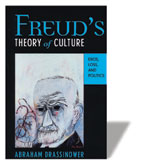 "Correcting the popular image of Freud as a morose pessimist, Drassinower presents him as a sober theorist of culture, where "culture" means a pedagogy of "mourning" which relentlessly pursues traces of Eros in the midst of our entanglement with death. Viewed in this way, Freud also emerges as a significant political thinker, steering a course between Hobbesian fear of death and Hegelian reconciliation, in the direction of an endeavor to lengthen creatively our "circuitous paths to death." A remarkably thoughtful, lucidly written work."
"Correcting the popular image of Freud as a morose pessimist, Drassinower presents him as a sober theorist of culture, where "culture" means a pedagogy of "mourning" which relentlessly pursues traces of Eros in the midst of our entanglement with death. Viewed in this way, Freud also emerges as a significant political thinker, steering a course between Hobbesian fear of death and Hegelian reconciliation, in the direction of an endeavor to lengthen creatively our "circuitous paths to death." A remarkably thoughtful, lucidly written work."
Fred Dallmayr, University of Notre Dame
"Freud's Theory of Culture is a pleasure to read. The work reveals a high degree of intelligence and learning. It has something to say and it says it clearly, elegantly, often poignantly. It is worthy of being read by anyone who works on Freud or his relationship to culture and politics."
Melissa Orlie, University of Illinois at Urbana-Champaign
Back to Top
Canadian Constitutional Law, Third Edition
Sujit Choudhry, Jean-Francois Gaudreault- Desbiens, Patrick Macklem, R.C.B. Risk, Kent Roach, Carol Rogerson, David Schneiderman and Lorraine Weinrib, along with Joel Bakan, John Borrows, Robin Elliot, Donna Greschner, Patricia Hughes, Jean Leclair, Richard Moon, and Bruce Ryder
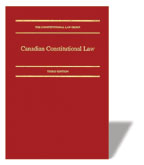 Sixteen academics from all parts of the country, known as the "Constitutional Law Group", joined forces to make this new edition a truly national project, one that benefits from geographical, regional, linguistic, and scholarly diversity. Canadian Constitutional Law provides up-to-date coverage and analysis of Charter jurisprudence, including recent developments in equality rights, freedom of expression, religion, and association, rights to life, liberty, and security of the person. With expanded analysis of contemporary constitutional issues relating to the Canadian federation, including secession, the spending power, the amending formulas, the criminal law, and the impact of international trade agreements on the constitutional order, the authors have provided the foundation for understanding constitutional decisions. The third edition remains true to the structure and purposes of previous editions, and especially to the idea that understanding constitutional history is critical to comprehending the present and future of Canadian constitutional law. This edition's historical reach has been extended back in time to the earliest colonial encounters between Aboriginal peoples and European colonies, and to the conflict between European empires over territorial and sovereign control of the continent.
Sixteen academics from all parts of the country, known as the "Constitutional Law Group", joined forces to make this new edition a truly national project, one that benefits from geographical, regional, linguistic, and scholarly diversity. Canadian Constitutional Law provides up-to-date coverage and analysis of Charter jurisprudence, including recent developments in equality rights, freedom of expression, religion, and association, rights to life, liberty, and security of the person. With expanded analysis of contemporary constitutional issues relating to the Canadian federation, including secession, the spending power, the amending formulas, the criminal law, and the impact of international trade agreements on the constitutional order, the authors have provided the foundation for understanding constitutional decisions. The third edition remains true to the structure and purposes of previous editions, and especially to the idea that understanding constitutional history is critical to comprehending the present and future of Canadian constitutional law. This edition's historical reach has been extended back in time to the earliest colonial encounters between Aboriginal peoples and European colonies, and to the conflict between European empires over territorial and sovereign control of the continent.
Back to Top
Tort Law, The International Library of Essays in Law & Legal Theory, Second Series
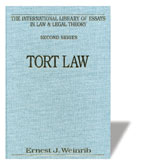 The first series of The International Library of Essays in Law and Legal Theory has established itself as a major research resource. The rapid growth of theoretically interesting scholarly work in law has increased a demand for a Second Series which includes significant recent work and also gives an opportunity to include additional areas of law. Volume editors have selected not only the most influential essays but those which they consider will be of greatest continuing importance. Each volume has an introduction which explains the context and the significance of the essays chosen. This volume contains essays on tort theory published in law journals over the last decade. All the essays explore the notions of justice that inform the doctrines and institutions of tort law. Many of them explicitly invoke the idea of corrective justice; others explore ideas of responsibility and fairness. Although the authors of these essays are frequently in disagreement with one another, they share a common interest in treating law as a normative phenomenon that is to be understood in moral terms.
The first series of The International Library of Essays in Law and Legal Theory has established itself as a major research resource. The rapid growth of theoretically interesting scholarly work in law has increased a demand for a Second Series which includes significant recent work and also gives an opportunity to include additional areas of law. Volume editors have selected not only the most influential essays but those which they consider will be of greatest continuing importance. Each volume has an introduction which explains the context and the significance of the essays chosen. This volume contains essays on tort theory published in law journals over the last decade. All the essays explore the notions of justice that inform the doctrines and institutions of tort law. Many of them explicitly invoke the idea of corrective justice; others explore ideas of responsibility and fairness. Although the authors of these essays are frequently in disagreement with one another, they share a common interest in treating law as a normative phenomenon that is to be understood in moral terms.
Back to Top
The Rule of Last Clear Chance
Judith McCormack
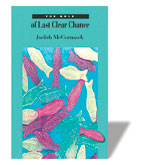 "Fresh, imaginative, witty." These words have all been used to describe Judith McCormack's stories, gathered in a powerful debut collection. McCormack's offbeat characters, many of them lawyers, provide a lively look at the absurdities that lie beneath the skin of everyday life. A grocer who sells lobsters, a Cuban apothecary, a hapless thief, and a dreamy lawyer who navigates by smell are some of the people who fall in and out of trouble in these stories. The collection follows their restless attempts to find footing in a colourful but tricky landscape. All of this is detailed in language with a remarkable sense of cadence, punctuated with tart insights.
"Fresh, imaginative, witty." These words have all been used to describe Judith McCormack's stories, gathered in a powerful debut collection. McCormack's offbeat characters, many of them lawyers, provide a lively look at the absurdities that lie beneath the skin of everyday life. A grocer who sells lobsters, a Cuban apothecary, a hapless thief, and a dreamy lawyer who navigates by smell are some of the people who fall in and out of trouble in these stories. The collection follows their restless attempts to find footing in a colourful but tricky landscape. All of this is detailed in language with a remarkable sense of cadence, punctuated with tart insights.
Her book has been called "devastatingly good" (John Metcalf); "an extraordinary new collection" (the Ottawa Citizen); and "a joy to read" (Nino Ricci). "The stories are rich with bang-on physical description, unforced natural dialogue and the telling particulars of daily life
The Rule of Last Clear Chance is a collection of substance
a debut to be savoured." (Quill and Quire).
Back to Top
Canadian Bankruptcy and Insolvency Law
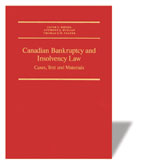 Bankruptcy law is no longer, if it ever was, the preoccupation of a few specialists. It permeates many branches of modern corporate, commercial, and consumer law and provides a rich intellectual fare, even for students not contemplating practicing in this field. This casebook is designed to give students an overview of the key issues in contemporary Canadian bankruptcy law and some appreciation of the actual operation of the Canadian bankruptcy system. It is a substantially expanded and revised version of part II of Secured Transactions in Personal Property, Suretyships and Insolvency, 3rd edition, by Jacob Ziegel and R.C.C. Cuming. The new edition includes updated and revised material in every chapter, as well as a new section on international insolvency. Introductory notes to many of the chapters and the notes preceding or following the source materials are intended to assist the student in putting topics and controversies in their proper context.
Bankruptcy law is no longer, if it ever was, the preoccupation of a few specialists. It permeates many branches of modern corporate, commercial, and consumer law and provides a rich intellectual fare, even for students not contemplating practicing in this field. This casebook is designed to give students an overview of the key issues in contemporary Canadian bankruptcy law and some appreciation of the actual operation of the Canadian bankruptcy system. It is a substantially expanded and revised version of part II of Secured Transactions in Personal Property, Suretyships and Insolvency, 3rd edition, by Jacob Ziegel and R.C.C. Cuming. The new edition includes updated and revised material in every chapter, as well as a new section on international insolvency. Introductory notes to many of the chapters and the notes preceding or following the source materials are intended to assist the student in putting topics and controversies in their proper context.
Back to Top
Comparative Consumer Insolvency Regimes
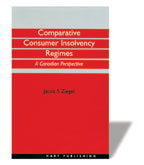 All modern legal systems with advanced economies must address the question of how to respond to the needs of insolvent consumers whose burden of debt greatly exceeds their capacity to repay within a reasonable time frame. This study surveys comparatively the insolvency regimes currently in place or likely to be adopted in the foreseeable future in Canada, the United States, Australia, England and Wales, Scotland, Scandinavia and a representative group of Western countries on the continent of Europe. Modern legal systems have two basic alternatives in providing relief for over-committed consumers. The first, which involves restricting the enforcement of individual creditor remedies is a method with which this study is not concerned. Where the consumer is seriously insolvent and owes money to many creditors, a different approach is required: a collective solution to debtor's problems. And this, the solution provided by modern insolvency systems, is the focus of this study.
All modern legal systems with advanced economies must address the question of how to respond to the needs of insolvent consumers whose burden of debt greatly exceeds their capacity to repay within a reasonable time frame. This study surveys comparatively the insolvency regimes currently in place or likely to be adopted in the foreseeable future in Canada, the United States, Australia, England and Wales, Scotland, Scandinavia and a representative group of Western countries on the continent of Europe. Modern legal systems have two basic alternatives in providing relief for over-committed consumers. The first, which involves restricting the enforcement of individual creditor remedies is a method with which this study is not concerned. Where the consumer is seriously insolvent and owes money to many creditors, a different approach is required: a collective solution to debtor's problems. And this, the solution provided by modern insolvency systems, is the focus of this study.
Back to Top
Tort Law: Cases And Materials, Second Edition
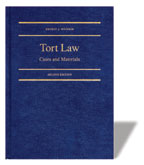 Professor Weinrib's casebook aims to illuminate tort law by including the most interesting judgments from the common law world, and to foster classroom debate by constantly juxtaposing judicial and academic material that gives conflicting views on the issues at hand. This new edition substantially revises and updates the previous edition with six years of case law, with major revisions to chapters dealing with duty of care, factual causation, wrongful life, vicarious liability, and psychiatric harm. The book's logical, natural progression through the basic building blocks of tort law encourages students to come to grips with judicial reasoning, not merely with the rules. The book combines comprehensive coverage with clarity and organization, making it perfectly suited for first-year students.
Professor Weinrib's casebook aims to illuminate tort law by including the most interesting judgments from the common law world, and to foster classroom debate by constantly juxtaposing judicial and academic material that gives conflicting views on the issues at hand. This new edition substantially revises and updates the previous edition with six years of case law, with major revisions to chapters dealing with duty of care, factual causation, wrongful life, vicarious liability, and psychiatric harm. The book's logical, natural progression through the basic building blocks of tort law encourages students to come to grips with judicial reasoning, not merely with the rules. The book combines comprehensive coverage with clarity and organization, making it perfectly suited for first-year students.
Back to Top

 The September 11 terrorist attacks on the World Trade Center and the Pentagon have forced countries around the world to reevaluate their defence policies. In September 11 Kent Roach provides a critical examination of the consequences of September 11 for Canada, showing how our laws, democracy, sovereignty, and security have been affected. A broad range of anti-terrorism measures are assessed, including the Anti-terrorism Act, the smart border agreement, Canadian participation in the war in Afghanistan, changes to refugee policy, the 2001 Security Budget, and the proposed Public Safety Act. Referring specifically to the threat of nuclear and biological terrorism and aviation safety, Roach argues that more emphasis on administrative and technological measures and less emphasis on criminal sanctions and military force may better protect Canadians from both terrorism and other threats to their security.
The September 11 terrorist attacks on the World Trade Center and the Pentagon have forced countries around the world to reevaluate their defence policies. In September 11 Kent Roach provides a critical examination of the consequences of September 11 for Canada, showing how our laws, democracy, sovereignty, and security have been affected. A broad range of anti-terrorism measures are assessed, including the Anti-terrorism Act, the smart border agreement, Canadian participation in the war in Afghanistan, changes to refugee policy, the 2001 Security Budget, and the proposed Public Safety Act. Referring specifically to the threat of nuclear and biological terrorism and aviation safety, Roach argues that more emphasis on administrative and technological measures and less emphasis on criminal sanctions and military force may better protect Canadians from both terrorism and other threats to their security.  The book is designed to equip health care providers and administrators to integrate ethical, legal, and human rights principles in protection and promotion of reproductive health, and to inform lawyers and women's health advocates about aspects of medicine and health care systems that affect reproduction. The authors integrate their disciplines in reproductive medicine, women's health, human rights, medical law and bioethics, to provide an accessible but comprehensive introduction to reproductive and sexual health. They analyze fifteen case studies of recurrent problems, focusing particularly on resource-poor settings. Approaches to resolution are considered at clinical and health system levels. They also consider kinds of social change that would relieve the underlying conditions of reproductive health dilemmas. The aim is to equip readers to fashion solutions in their own health care circumstances, compatibly with ethical, legal and human rights principles.
The book is designed to equip health care providers and administrators to integrate ethical, legal, and human rights principles in protection and promotion of reproductive health, and to inform lawyers and women's health advocates about aspects of medicine and health care systems that affect reproduction. The authors integrate their disciplines in reproductive medicine, women's health, human rights, medical law and bioethics, to provide an accessible but comprehensive introduction to reproductive and sexual health. They analyze fifteen case studies of recurrent problems, focusing particularly on resource-poor settings. Approaches to resolution are considered at clinical and health system levels. They also consider kinds of social change that would relieve the underlying conditions of reproductive health dilemmas. The aim is to equip readers to fashion solutions in their own health care circumstances, compatibly with ethical, legal and human rights principles.  The reasonable person standard plays a central role in the law, figuring prominently in tort law, criminal law, and administrative law. However, the reasonable person has also attracted substantial criticism from egalitarian critics and feminists insofar as it presupposes contested notions of "normal" behaviour and may discriminate against certain classes of defendant. Judges and mainstream theorists also increasingly puzzle over what the standard amounts to and how to apply it. Using these controversies as a point of departure, Rethinking the Reasonable Person examines the promise and the perils of the reasonable person standard. Ultimately, it argues that an objective standard is not only defensible but essential. Yet only with a radical reconstruction will it be possible to realize the promise of the standard and to ensure a truly egalitarian conception of responsibility.
The reasonable person standard plays a central role in the law, figuring prominently in tort law, criminal law, and administrative law. However, the reasonable person has also attracted substantial criticism from egalitarian critics and feminists insofar as it presupposes contested notions of "normal" behaviour and may discriminate against certain classes of defendant. Judges and mainstream theorists also increasingly puzzle over what the standard amounts to and how to apply it. Using these controversies as a point of departure, Rethinking the Reasonable Person examines the promise and the perils of the reasonable person standard. Ultimately, it argues that an objective standard is not only defensible but essential. Yet only with a radical reconstruction will it be possible to realize the promise of the standard and to ensure a truly egalitarian conception of responsibility. Anglo-American private law (the law governing mutual rights and obligations of individuals) has been a far more complex phenomenon than is usually recognized. Attempts to reduce it to a single explanatory principle, or to a precisely classified or categorized map, scheme, or diagram, are likely to distort the past by omitting or marginalizing material inconsistent with proposed principles or schemes. Many legal issues cannot be allocated exclusively to one category. Often several concepts have worked concurrently and cumulatively, so that competing explanations and categories are not so much alternatives, of which only one can be correct, as different dimensions of a complex phenomenon, of which several may be simultaneously valid and necessary. This study will be of importance to those interested in property, tort, contract, unjust enrichment, legal reasoning, legal method, the history of the common law, and the relation between legal theory and legal history.
Anglo-American private law (the law governing mutual rights and obligations of individuals) has been a far more complex phenomenon than is usually recognized. Attempts to reduce it to a single explanatory principle, or to a precisely classified or categorized map, scheme, or diagram, are likely to distort the past by omitting or marginalizing material inconsistent with proposed principles or schemes. Many legal issues cannot be allocated exclusively to one category. Often several concepts have worked concurrently and cumulatively, so that competing explanations and categories are not so much alternatives, of which only one can be correct, as different dimensions of a complex phenomenon, of which several may be simultaneously valid and necessary. This study will be of importance to those interested in property, tort, contract, unjust enrichment, legal reasoning, legal method, the history of the common law, and the relation between legal theory and legal history. Murdering Holiness explores the story of the "Holy Roller" sect led by Franz Creffield in the early years of the twentieth century. In the opening chapters, the authors introduce us to the community of Corvallis, Oregon, where Creffield, a charismatic, selfstyled messiah, taught his followers to forsake their families and worldly possessions and to seek salvation through him. As his teachings became more extreme, the local community reacted: Creffield was tarred and feathered and his followers were incarcerated in the state asylum. Creffield himself was later imprisoned for adultery, but shortly after his release he revived the sect. This proved too much for some of the adherents' families, and in May 1906 George Mitchell, the brother of two women in the sect, pursued Creffield to Seattle and shot him dead. The authors take us into the courtroom for the trial that made headlines across North America. Based on court records and archival sources, this case study includes a detailed examination of the trial, the media's response to it, and the dramatic aftermath.
Murdering Holiness explores the story of the "Holy Roller" sect led by Franz Creffield in the early years of the twentieth century. In the opening chapters, the authors introduce us to the community of Corvallis, Oregon, where Creffield, a charismatic, selfstyled messiah, taught his followers to forsake their families and worldly possessions and to seek salvation through him. As his teachings became more extreme, the local community reacted: Creffield was tarred and feathered and his followers were incarcerated in the state asylum. Creffield himself was later imprisoned for adultery, but shortly after his release he revived the sect. This proved too much for some of the adherents' families, and in May 1906 George Mitchell, the brother of two women in the sect, pursued Creffield to Seattle and shot him dead. The authors take us into the courtroom for the trial that made headlines across North America. Based on court records and archival sources, this case study includes a detailed examination of the trial, the media's response to it, and the dramatic aftermath.  "Correcting the popular image of Freud as a morose pessimist, Drassinower presents him as a sober theorist of culture, where "culture" means a pedagogy of "mourning" which relentlessly pursues traces of Eros in the midst of our entanglement with death. Viewed in this way, Freud also emerges as a significant political thinker, steering a course between Hobbesian fear of death and Hegelian reconciliation, in the direction of an endeavor to lengthen creatively our "circuitous paths to death." A remarkably thoughtful, lucidly written work."
"Correcting the popular image of Freud as a morose pessimist, Drassinower presents him as a sober theorist of culture, where "culture" means a pedagogy of "mourning" which relentlessly pursues traces of Eros in the midst of our entanglement with death. Viewed in this way, Freud also emerges as a significant political thinker, steering a course between Hobbesian fear of death and Hegelian reconciliation, in the direction of an endeavor to lengthen creatively our "circuitous paths to death." A remarkably thoughtful, lucidly written work." Sixteen academics from all parts of the country, known as the "Constitutional Law Group", joined forces to make this new edition a truly national project, one that benefits from geographical, regional, linguistic, and scholarly diversity. Canadian Constitutional Law provides up-to-date coverage and analysis of Charter jurisprudence, including recent developments in equality rights, freedom of expression, religion, and association, rights to life, liberty, and security of the person. With expanded analysis of contemporary constitutional issues relating to the Canadian federation, including secession, the spending power, the amending formulas, the criminal law, and the impact of international trade agreements on the constitutional order, the authors have provided the foundation for understanding constitutional decisions. The third edition remains true to the structure and purposes of previous editions, and especially to the idea that understanding constitutional history is critical to comprehending the present and future of Canadian constitutional law. This edition's historical reach has been extended back in time to the earliest colonial encounters between Aboriginal peoples and European colonies, and to the conflict between European empires over territorial and sovereign control of the continent.
Sixteen academics from all parts of the country, known as the "Constitutional Law Group", joined forces to make this new edition a truly national project, one that benefits from geographical, regional, linguistic, and scholarly diversity. Canadian Constitutional Law provides up-to-date coverage and analysis of Charter jurisprudence, including recent developments in equality rights, freedom of expression, religion, and association, rights to life, liberty, and security of the person. With expanded analysis of contemporary constitutional issues relating to the Canadian federation, including secession, the spending power, the amending formulas, the criminal law, and the impact of international trade agreements on the constitutional order, the authors have provided the foundation for understanding constitutional decisions. The third edition remains true to the structure and purposes of previous editions, and especially to the idea that understanding constitutional history is critical to comprehending the present and future of Canadian constitutional law. This edition's historical reach has been extended back in time to the earliest colonial encounters between Aboriginal peoples and European colonies, and to the conflict between European empires over territorial and sovereign control of the continent. The first series of The International Library of Essays in Law and Legal Theory has established itself as a major research resource. The rapid growth of theoretically interesting scholarly work in law has increased a demand for a Second Series which includes significant recent work and also gives an opportunity to include additional areas of law. Volume editors have selected not only the most influential essays but those which they consider will be of greatest continuing importance. Each volume has an introduction which explains the context and the significance of the essays chosen. This volume contains essays on tort theory published in law journals over the last decade. All the essays explore the notions of justice that inform the doctrines and institutions of tort law. Many of them explicitly invoke the idea of corrective justice; others explore ideas of responsibility and fairness. Although the authors of these essays are frequently in disagreement with one another, they share a common interest in treating law as a normative phenomenon that is to be understood in moral terms.
The first series of The International Library of Essays in Law and Legal Theory has established itself as a major research resource. The rapid growth of theoretically interesting scholarly work in law has increased a demand for a Second Series which includes significant recent work and also gives an opportunity to include additional areas of law. Volume editors have selected not only the most influential essays but those which they consider will be of greatest continuing importance. Each volume has an introduction which explains the context and the significance of the essays chosen. This volume contains essays on tort theory published in law journals over the last decade. All the essays explore the notions of justice that inform the doctrines and institutions of tort law. Many of them explicitly invoke the idea of corrective justice; others explore ideas of responsibility and fairness. Although the authors of these essays are frequently in disagreement with one another, they share a common interest in treating law as a normative phenomenon that is to be understood in moral terms. "Fresh, imaginative, witty." These words have all been used to describe Judith McCormack's stories, gathered in a powerful debut collection. McCormack's offbeat characters, many of them lawyers, provide a lively look at the absurdities that lie beneath the skin of everyday life. A grocer who sells lobsters, a Cuban apothecary, a hapless thief, and a dreamy lawyer who navigates by smell are some of the people who fall in and out of trouble in these stories. The collection follows their restless attempts to find footing in a colourful but tricky landscape. All of this is detailed in language with a remarkable sense of cadence, punctuated with tart insights.
"Fresh, imaginative, witty." These words have all been used to describe Judith McCormack's stories, gathered in a powerful debut collection. McCormack's offbeat characters, many of them lawyers, provide a lively look at the absurdities that lie beneath the skin of everyday life. A grocer who sells lobsters, a Cuban apothecary, a hapless thief, and a dreamy lawyer who navigates by smell are some of the people who fall in and out of trouble in these stories. The collection follows their restless attempts to find footing in a colourful but tricky landscape. All of this is detailed in language with a remarkable sense of cadence, punctuated with tart insights. Bankruptcy law is no longer, if it ever was, the preoccupation of a few specialists. It permeates many branches of modern corporate, commercial, and consumer law and provides a rich intellectual fare, even for students not contemplating practicing in this field. This casebook is designed to give students an overview of the key issues in contemporary Canadian bankruptcy law and some appreciation of the actual operation of the Canadian bankruptcy system. It is a substantially expanded and revised version of part II of Secured Transactions in Personal Property, Suretyships and Insolvency, 3rd edition, by Jacob Ziegel and R.C.C. Cuming. The new edition includes updated and revised material in every chapter, as well as a new section on international insolvency. Introductory notes to many of the chapters and the notes preceding or following the source materials are intended to assist the student in putting topics and controversies in their proper context.
Bankruptcy law is no longer, if it ever was, the preoccupation of a few specialists. It permeates many branches of modern corporate, commercial, and consumer law and provides a rich intellectual fare, even for students not contemplating practicing in this field. This casebook is designed to give students an overview of the key issues in contemporary Canadian bankruptcy law and some appreciation of the actual operation of the Canadian bankruptcy system. It is a substantially expanded and revised version of part II of Secured Transactions in Personal Property, Suretyships and Insolvency, 3rd edition, by Jacob Ziegel and R.C.C. Cuming. The new edition includes updated and revised material in every chapter, as well as a new section on international insolvency. Introductory notes to many of the chapters and the notes preceding or following the source materials are intended to assist the student in putting topics and controversies in their proper context. All modern legal systems with advanced economies must address the question of how to respond to the needs of insolvent consumers whose burden of debt greatly exceeds their capacity to repay within a reasonable time frame. This study surveys comparatively the insolvency regimes currently in place or likely to be adopted in the foreseeable future in Canada, the United States, Australia, England and Wales, Scotland, Scandinavia and a representative group of Western countries on the continent of Europe. Modern legal systems have two basic alternatives in providing relief for over-committed consumers. The first, which involves restricting the enforcement of individual creditor remedies is a method with which this study is not concerned. Where the consumer is seriously insolvent and owes money to many creditors, a different approach is required: a collective solution to debtor's problems. And this, the solution provided by modern insolvency systems, is the focus of this study.
All modern legal systems with advanced economies must address the question of how to respond to the needs of insolvent consumers whose burden of debt greatly exceeds their capacity to repay within a reasonable time frame. This study surveys comparatively the insolvency regimes currently in place or likely to be adopted in the foreseeable future in Canada, the United States, Australia, England and Wales, Scotland, Scandinavia and a representative group of Western countries on the continent of Europe. Modern legal systems have two basic alternatives in providing relief for over-committed consumers. The first, which involves restricting the enforcement of individual creditor remedies is a method with which this study is not concerned. Where the consumer is seriously insolvent and owes money to many creditors, a different approach is required: a collective solution to debtor's problems. And this, the solution provided by modern insolvency systems, is the focus of this study. Professor Weinrib's casebook aims to illuminate tort law by including the most interesting judgments from the common law world, and to foster classroom debate by constantly juxtaposing judicial and academic material that gives conflicting views on the issues at hand. This new edition substantially revises and updates the previous edition with six years of case law, with major revisions to chapters dealing with duty of care, factual causation, wrongful life, vicarious liability, and psychiatric harm. The book's logical, natural progression through the basic building blocks of tort law encourages students to come to grips with judicial reasoning, not merely with the rules. The book combines comprehensive coverage with clarity and organization, making it perfectly suited for first-year students.
Professor Weinrib's casebook aims to illuminate tort law by including the most interesting judgments from the common law world, and to foster classroom debate by constantly juxtaposing judicial and academic material that gives conflicting views on the issues at hand. This new edition substantially revises and updates the previous edition with six years of case law, with major revisions to chapters dealing with duty of care, factual causation, wrongful life, vicarious liability, and psychiatric harm. The book's logical, natural progression through the basic building blocks of tort law encourages students to come to grips with judicial reasoning, not merely with the rules. The book combines comprehensive coverage with clarity and organization, making it perfectly suited for first-year students.